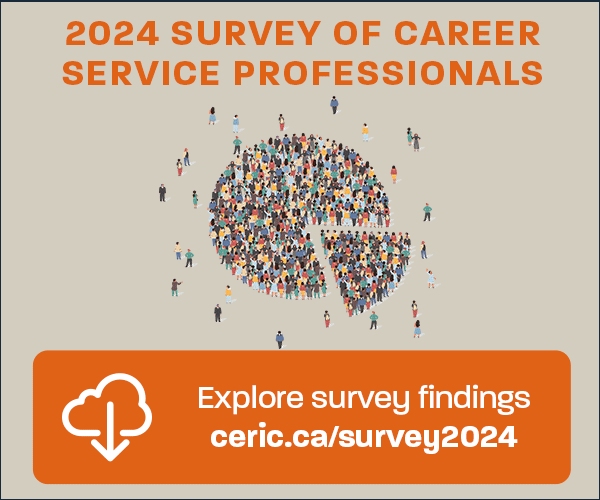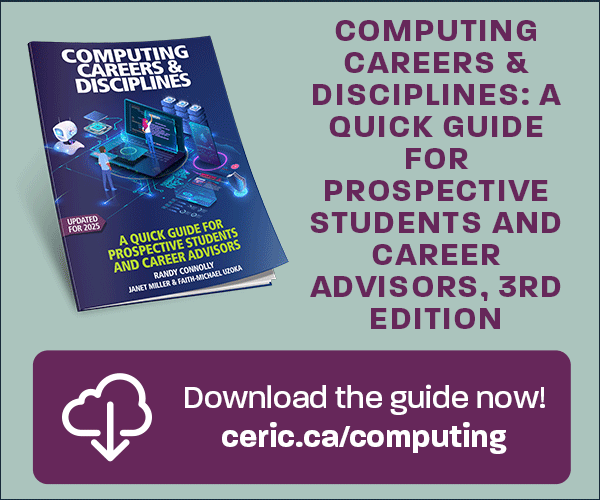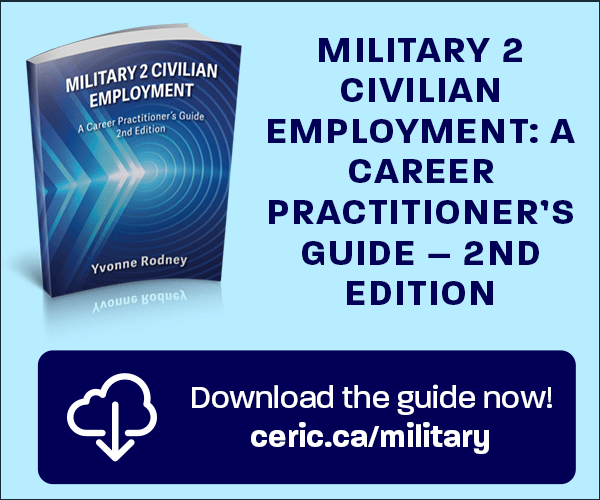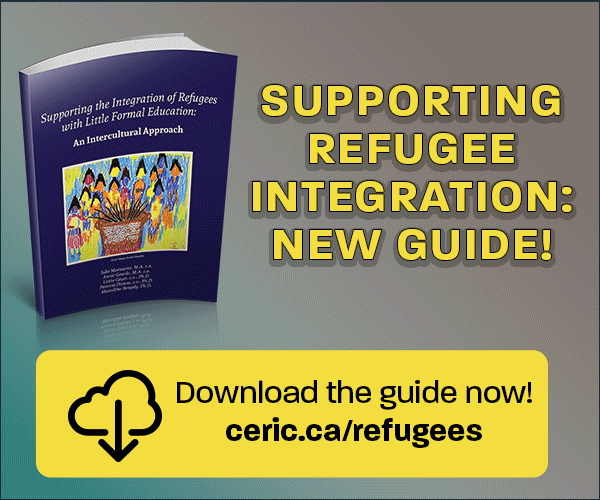Artificial Intelligence and Résumé Critique Experiences
DOI:
https://doi.org/10.53379/cjcd.2022.338Keywords:
career services, knowledge and skills, co-operative education, experimentAbstract
Where résumés are concerned, student supports tend to include tactical feedback that addresses issues in students’ writing and strategic feedback aimed at coaching critical self-reflection. However, there is not always time to cover all that could be offered by both kinds of feedback in a single résumé critique. Given demands on staff time, many career services administrators are considering opportunities to leverage artificial intelligence-based (AI) products that might offer tactical feedback and allow staff to focus on offering strategic feedback. In a field experiment, we explored how novice job seekers’ use of an AI-based résumé critique product influenced their subsequent face-to-face résumé critique experiences, especially the kinds of feedback offered and learning outcomes that resulted from this. As expected, the AI offered substantial tactical feedback and less strategic feedback. Students’ use of the AI did not result in greater opportunity for strategic feedback and associated learning outcomes. Rather, the AI rendered issues in students’ writing more salient. In turn, this invited more attention to tactical aspects and less attention to strategic aspects of students’ résumés.
References
Amundson, N., Westwood, M., & Prefontaine, R. (1995). Cultural bridging and employment counselling with clients from different cultural backgrounds. Canadian Journal of Counselling, 29(3), 206-213. https://cjc-rcc.ucalgary.ca/article/view/58529/44028
Aoun, J. E. (2017). Robot-proof: Higher education in the age of artificial intelligence. MIT press.
Barney, M., & Madigan, J. (2019). Rethinking coaching and emotions with new artificial intelligence. Squarespace. https://static1.squarespace.com/static/56dd8a952b8dde60536232ed/t/5dbb61d186752115895e6079/1572561365471/Rethinking+Coaching+and+Emotions+with+New+AI+LeaderAmp+2019.pdf
Cox, A. M. (2021). Exploring the impact of artificial intelligence and robots on higher education through literature-based design fictions. International Journal of Educational Technology in Higher Education, 18(3). https://doi.org/10.1186/s41239-020-00237-8
Crozier, S. D., & Lalande, V. (1995). Cooperating with Coop. Paper presented at the Canadian Association of College and University Students Services Conference, Guelph, ON.
Dietsche, P., & Lees, J. (2017). Insight into Canadian post-secondary career service models: Final report. https://ceric.ca/project/insight-into-canadian-post-secondary-career-service-models/
Gallup. (2016). Gallup-Purdue index report: Great jobs. Great Lives. The value of career services, inclusive experiences and mentorship for college graduates. https://acue.org/wp-content/uploads/2018/11/Gallup-Purdue-Index-Study-Year-3-2016.pdf
Glikson, E., & Woolley, A. W. (2020). Human trust in artificial intelligence: Review of empirical research. Academy of Management Annals, 14(2). https://doi.org/10.5465/annals.2018.0057
Hattie, J., & Timperley, H. (2007). The power of feedback. Review of Educational Research, 77(1), 81-112. https://www.jstor.org/stable/4624888
Koo, T. K., & Li, M. Y. (2016). A guideline of selecting and reporting intraclass correlation coefficients for reliability research. Journal of Chiropractic Medicine, 15(2), 155-163.
Lalande, V., & DeBoer, J. (2012). Evaluation of an online psychoeducational career workshop. In R. Shea and R. Joy (Eds.), A multi-sectoral approach to career development: A decade of Canadian research (pp. 330-342). Canadian Journal of Career Development. https://cjcd-rcdc.ceric.ca/index.php/cjcd/anniversary
Lee, T., Jagannath, K., Aggarwal, N., Sridar, R., Wilde, S., Hill, T., & Chen, Y. (2019). Intelligent career advisers in your pocket? A need assessment study of chatbots for student career advising. AMCIS 2019 Proceedings. https://aisel.aisnet.org/amcis2019/human_computer_interact/human_computer_interact/14/
Luo, X., Tong, S., Fang, Z., & Qu, Z. (2019). Frontiers: Machines vs. humans: The impact of artificial intelligence chatbot disclosure on customer purchases. Marketing Science, 38 (6), 937–947. https://doi.org/10.1287/mksc.2019.1192
Makela, J. P., Seo, G., Sun, H., & Rooney, G. S. (2014). The value of using career services: A comparison of users and non-users. The Career Center, University of Illinois at Urbana-Champaign. https://www.careercenter.illinois.edu/sites/default/files/downloads/NASPAReport-Value-FINAL.pdf
McDow, L. W., & Zabrucky, K. M. (2015). Effectiveness of a career development course on students’ job search skills and self-efficacy. Journal of College Student Development, 56(6), 632-636. https://doi.org/10.1353/csd.2015.0058
Nguyen, J., Sánchez-Hernández, G., Armisen, A., Agell, N., Rovira, X., & Angulo, C. (2018). A linguistic multi-criteria decision-aiding system to support university career services. Applied Soft Computing, 67, 933-940. https://doi.org/10.1016/j.asoc.2017.06.052
Razack, H. I. A., Mathew, S. T., Saad, F. F. A., & Alqahtani, S. A. (2021). Artificial intelligence-assisted tools for redefining the communication landscape of the scholarly world. Science Editing, 8(2), 134-144.
Sampson, J. P., & Reardon, R. C. (1998). Maximizing staff resources in meeting the needs of job seekers in one-stop centers. Journal of Employment Counseling, 35(2), 50-68.
Shore, T., Tashchian, A., & Forrester, W. R. (2021). The influence of resume quality and ethnicity cues on employment decisions. Journal of Business and Economics Management, 22(1), 61-76. https://doi.org/10.3846/jbem.2020.13670
Stevens, A. H., Kurlaender, M., & Grosz, M. (2019). Career technical education and labor market outcomes: Evidence from California community colleges. The Journal of Human Resources, 54, 986-1036. https://doi.org/10.3368/jhr.54.4.1015.7449R2
Tong, S., Jia, N., Luo, X., & Fang, Z. (2021). The Janus face of artificial intelligence feedback: Deployment versus disclosure effects on employee performance. Strategic Management Journal, 42(9), 1600-1631. https://doi.org/10.1002/smj.3322
Toporek, R. L., & Cohen, R. F. (2017). Strength-based narrative résumé counseling: Constructing positive career identities from difficult employment histories. The Career Development Quarterly, 65(3), 222–236. https://doi.org/10.1002/cdq.12094
Toporek, R. L., & Flamer, C. (2009). The résumé’s secret identity: A tool for narrative exploration in multicultural career counseling. Journal of Employment Counseling, 46(1), 4-17.
Zeithaml, V. A., Berry, L. L., & Parasuraman, A. (1996). The behavioral consequences of service quality. Journal of Marketing, 60(2), 31-46. https://journals.sagepub.com/doi/pdf/10.1177/002224299606000203?casa_token=FRdMemSFH3MAAAAA:EKsWsf4Pid3FQHf6_jN5rAFCGiKzrZJALHU3ty1kaTxMOqt49GOzRFtwafihrZ71MtwKnWwkhDLs

Downloads
Published
How to Cite
Issue
Section
License
Copyright (c) 2022 Canadian Journal of Career Development

This work is licensed under a Creative Commons Attribution-NonCommercial-NoDerivatives 4.0 International License.
















